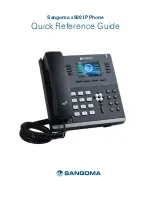
the phone with your hearing device is the best way to evaluate it for your personal
needs .
This phone has been tested and rated for use with hearing aids for some of the
wireless technologies that it uses . However, there may be some newer wireless
technologies used in this phone that have not been tested yet for use with hearing
aids . It is important to try the different features of this phone thoroughly and in
different locations, using your hearing aid or cochlear implant, to determine if
you hear any interfering noise . Consult your service provider or the manufacturer
of this phone for information on hearing aid compatibility . If you have questions
about return or exchange policies, consult your service provider or phone retailer .
M-Ratings: Phones rated M3 or M4 meet FCC requirements and are likely to
generate less interference to hearing devices than phones that are not labeled .
M4 is the better/higher of the two ratings .
T-Ratings: Phones rated T3 or T4 meet FCC requirements and are likely to be more
usable with a hearing device’s telecoil (“T Switch” or “Telephone Switch”) than
unrated phones . T4 is the better/ higher of the two ratings .
(Note that not all hearing devices have telecoils in them .)
Your phone meets the M4/T4 level rating.
Hearing devices may also be rated . Your hearing device manufacturer or hearing
health professional may help you find this rating . For more information about FCC
Hearing Aid Compatibility, please go to http://www .fcc .gov/cgb/dro .
66
For Your Safety
CTIA
a) Do not disassemble or open crush, bend or deform, puncture or shred .
b) Do not modify or remanufacture, attempt to insert foreign objects into the
battery, immerse or expose to water or other liquids, expose to fire, explosion
or other hazard .
c) Only use the battery for the system for which it is specified .
d) Only use the battery with a charging system that has been qualified with the
system per CTIA Certification Requirements for Battery System Compliance
to IEEE 1725 . Use of an unqualified battery or charger may present a risk of fire,
explosion, leakage, or other hazard .
e) Do not short circuit a battery or allow metallic conductive objects to contact
battery terminals .
f ) Replace the battery only with another battery that has been qualified with the
system per this standard, IEEE-Std-1725 . Use of an unqualified battery may
present a risk of fire, explosion, leakage or other hazard .
g) Promptly dispose of used batteries in accordance with local regulations .
h) Battery usage by children should be supervised .
i ) Avoid dropping the phone or battery . If the phone or battery is dropped,
especially on a hard surface, and the user suspects damage, take it to a service
center for inspection .
j) Improper battery use may result in a fire, explosion or other hazard .
For those host devices that utilize a USB port as a charging source, the host
device’s user manual shall include a statement that the phone shall only be
connected to CTIA certified adapters, products that bear the USB-IF logo or
products that have completed the USB-IF compliance program .
67
For Your Safety
Summary of Contents for AT&T Avail 2
Page 1: ...User Guide AT T Avail 2 ...
Page 45: ...80 Notes ...








































